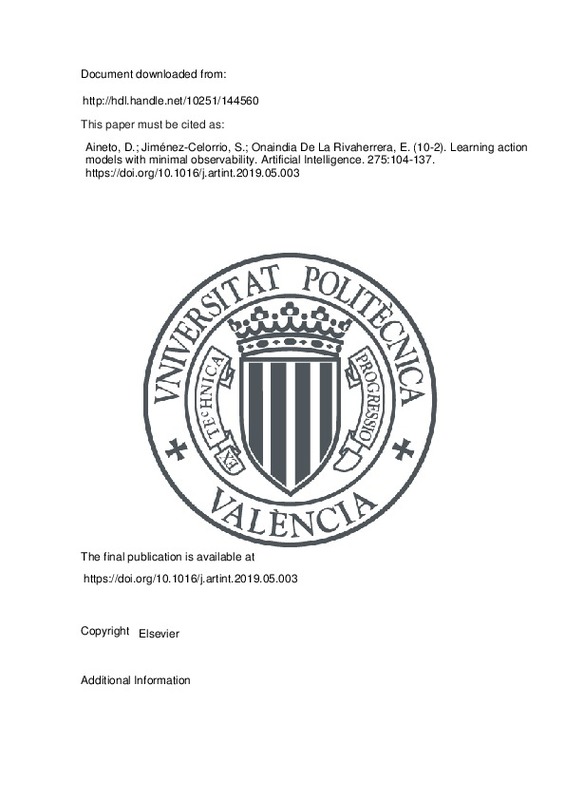JavaScript is disabled for your browser. Some features of this site may not work without it.
Buscar en RiuNet
Listar
Mi cuenta
Estadísticas
Ayuda RiuNet
Admin. UPV
Learning action models with minimal observability
Mostrar el registro sencillo del ítem
Ficheros en el ítem
| dc.contributor.author | Aineto, Diego
|
es_ES |
| dc.contributor.author | Jiménez-Celorrio, Sergio
|
es_ES |
| dc.contributor.author | Onaindia De La Rivaherrera, Eva
|
es_ES |
| dc.date.accessioned | 2020-05-29T03:32:25Z | |
| dc.date.available | 2020-05-29T03:32:25Z | |
| dc.date.issued | 2019-10 | es_ES |
| dc.identifier.issn | 0004-3702 | es_ES |
| dc.identifier.uri | http://hdl.handle.net/10251/144560 | |
| dc.description.abstract | [EN] This paper presents FAMA, a novel approach for learning STRIPS action models from observations of plan executions that compiles the learning task into a classical planning task. Unlike all existing learning systems, FAMA is able to learn when the actions of the plan executions are partially or totally unobservable and information on intermediate states is partially provided. This flexibility makes FAMA an ideal learning approach in domains where only sensoring data are accessible. Additionally, we leverage the compilation scheme and extend it to come up with an evaluation method that allows us to assess the quality of a learned model syntactically, that is, with respect to the actual model; and, semantically, that is, with respect to a set of observations of plan executions. We also show that the extended compilation scheme can be used to lay the foundations of a framework for action model comparison. FAMA is exhaustively evaluated over a wide range of IPC domains and its performance is compared to ARMS, a state-of-the-art benchmark in action model learning. (C) 2019 Elsevier B.V. All rights reserved. | es_ES |
| dc.description.sponsorship | This work is supported by the Spanish MINECO project TIN2017-88476-C2-1-R. Diego Aineto is partially supported by the FPU16/03184 and Sergio Jimenez by the RYC15/18009, both programs funded by the Spanish government. | es_ES |
| dc.language | Inglés | es_ES |
| dc.publisher | Elsevier | es_ES |
| dc.relation.ispartof | Artificial Intelligence | es_ES |
| dc.rights | Reserva de todos los derechos | es_ES |
| dc.subject | Action model learning | es_ES |
| dc.subject | Al planning | es_ES |
| dc.subject | Machine learning | es_ES |
| dc.subject.classification | LENGUAJES Y SISTEMAS INFORMATICOS | es_ES |
| dc.subject.classification | CIENCIAS DE LA COMPUTACION E INTELIGENCIA ARTIFICIAL | es_ES |
| dc.title | Learning action models with minimal observability | es_ES |
| dc.type | Artículo | es_ES |
| dc.identifier.doi | 10.1016/j.artint.2019.05.003 | es_ES |
| dc.relation.projectID | info:eu-repo/grantAgreement/MECD//FPU16%2F03184/ES/FPU16%2F03184/ | es_ES |
| dc.relation.projectID | info:eu-repo/grantAgreement/MINECO//RYC-2015-18009/ES/RYC-2015-18009/ | es_ES |
| dc.relation.projectID | info:eu-repo/grantAgreement/AEI/Plan Estatal de Investigación Científica y Técnica y de Innovación 2013-2016/TIN2017-88476-C2-1-R/ES/RECONOCIMIENTO DE ACTIVIDADES Y PLANIFICACION AUTOMATICA PARA EL DISEÑO DE ASISTENTES INTELIGENTES/ | es_ES |
| dc.rights.accessRights | Abierto | es_ES |
| dc.contributor.affiliation | Universitat Politècnica de València. Departamento de Sistemas Informáticos y Computación - Departament de Sistemes Informàtics i Computació | es_ES |
| dc.description.bibliographicCitation | Aineto, D.; Jiménez-Celorrio, S.; Onaindia De La Rivaherrera, E. (2019). Learning action models with minimal observability. Artificial Intelligence. 275:104-137. https://doi.org/10.1016/j.artint.2019.05.003 | es_ES |
| dc.description.accrualMethod | S | es_ES |
| dc.relation.publisherversion | https://doi.org/10.1016/j.artint.2019.05.003 | es_ES |
| dc.description.upvformatpinicio | 104 | es_ES |
| dc.description.upvformatpfin | 137 | es_ES |
| dc.type.version | info:eu-repo/semantics/publishedVersion | es_ES |
| dc.description.volume | 275 | es_ES |
| dc.relation.pasarela | S\388673 | es_ES |
| dc.contributor.funder | Agencia Estatal de Investigación | es_ES |
| dc.contributor.funder | Ministerio de Economía y Competitividad | es_ES |
| dc.contributor.funder | Ministerio de Educación, Cultura y Deporte | es_ES |







![[Cerrado]](/themes/UPV/images/candado.png)

